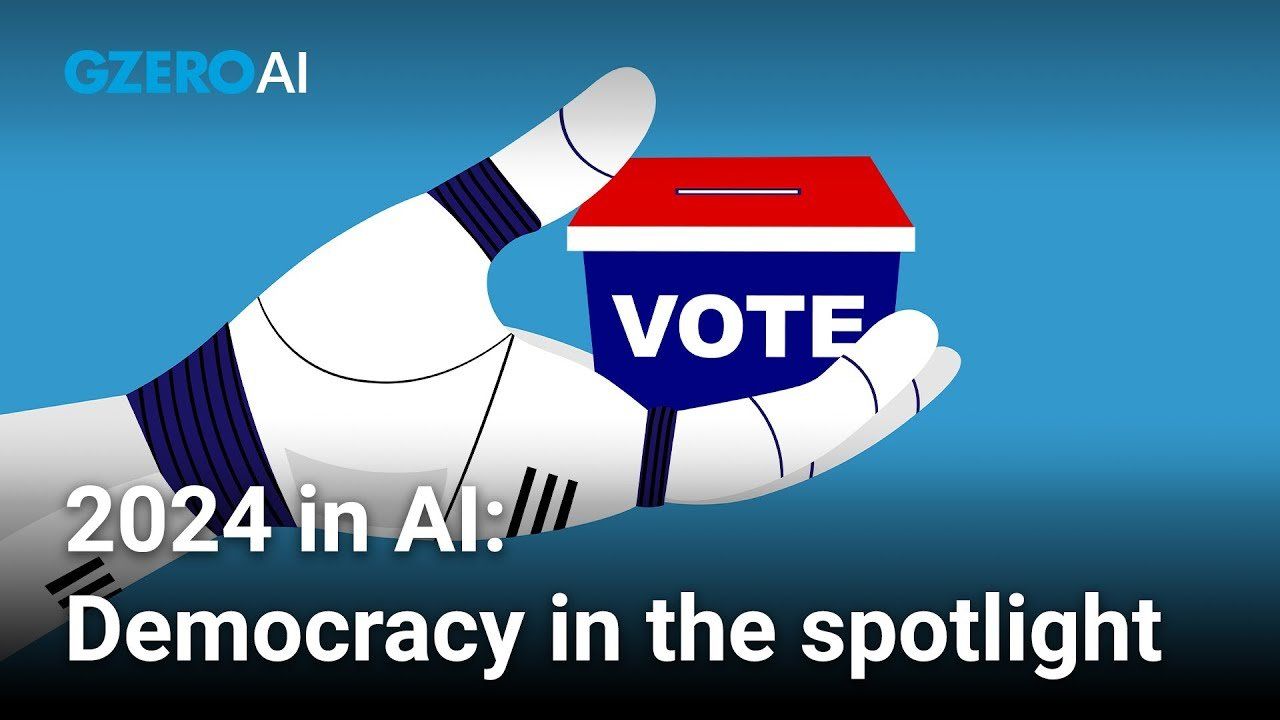
Marietje Schaake, International Policy Fellow, Stanford Human-Centered Artificial Intelligence, and former European Parliamentarian, co-hosts GZERO AI, our new weekly video series intended to help you keep up and make sense of the latest news on the AI revolution. In this episode, she shares her reflection on AI in 2023.
Hello, this is GZERO AI. My name is Marietje Schaake. It's the end of the year, and so it's the time for lists. As we see so many top fives, top threes, top tens of the key developments in AI, I thought I would just share a couple of reflections. Not list them, just look back on this year, which was remarkable in so many ways.
We saw a huge explosion of discussion around AI governance. Are companies, the ones that can take on all this responsibility of assessing risk, or deciding when to push new research onto the market, or as illustrated by the dramatic saga at OpenAI, are companies not in a good position to make all these decisions themselves and to sort of design checks and balances all in-house? Governments agree. I don't think they want to let these decisions to the big companies, and so they are really stepping up across the board and across the globe. We've only recently, in the last days of this year, seen the political agreement around the EU AI Act, a landmark law that will really set a standard in the democratic world for governing AI in a binding fashion. But there were also a lot of voluntary code of conduct, as we saw at the G7, statements that came out of the AI Safety Summit like the Bletchley Park Declaration, and there was the White House's executive order to add to the many initiatives that were taken in an attempt to make sure that AI developments at least respect the laws that are on the book, if not make new ones where needed.
Now, what I thought was missing quite a bit, looking at the AI Safety Summit, for example, but also in discussions in my home country, the Netherlands, there were elections where AI did not feature at all in the political debate. Is a better discussion, more informed, and more anticipatory about job displacement? I think it is potentially a most devastating and most disruptive development, and yet we don't really hear so much about it short of reports by consulting firms that predict macroeconomic benefits over the long run. But if you look at the political fallout of job displacement and the need to have resources, for example, to reskill and retrain people. There is a need for a much more public debate and maybe even to start talking about the T-word, namely taxing AI companies.
What I also think is missing still, despite having had more reference to the Global South, is true engagement of people from all over the world, not just from the most advanced economies, but really, to have a global engagement with people to understand their lived experiences and needs with regard to the rollout of AI. Because even if people do not have agency over what AI decides about them, there will still be impact even if people are not even online yet. So I think it is incredibly important to have a more global, inclusive, and equal discussion with people from all over the world, and that will be something I'll be looking out for the year 2024.
What I also think is missing still, despite having had more reference to the Global South, is true engagement of people from all over the world, not just from the most advanced economies, but really, to have a global engagement with people to understand their lived experiences and needs with regard to the rollout of AI. Because even if people do not have agency over what AI decides about them, there will still be impact even if people are not even online yet. So I think it is incredibly important to have a more global, inclusive, and equal discussion with people from all over the world, and that will be something I'll be looking out for the year 2024.
And then last, and certainly not least, 2024 has been called the Year of Democracy. I hope we will say the same when we look back a year from now. There will be an unprecedented amount of people going to the polls, and there are still a lot of question marks about how disruptive AI is going to be for the public debate, the political debate, new means of manipulating, sharing disinformation with synthetic media that is really, really hard to distinguish from authentic human-uttered expressions. Really, the combination of AI and elections, AI and democracy deserves a lot more attention and will probably draw attention in the year where billions of people will take to the polls, 2024.
For now, let me wish you a happy holiday season with friends and few screens, I hope. And we will see each other again afresh in the new year. Happy New Year and happy holidays.
- AI explosion, elections, and wars: What to expect in 2024 ›
- The world of AI in 2024 ›
- ChatGPT and the 2024 US election ›
- How AI threatens elections ›
- AI, election integrity, and authoritarianism: Insights from Maria Ressa ›
- How to protect elections in the age of AI - GZERO Media ›
- When AI makes mistakes, who can be held responsible? - GZERO Media ›
- AI's potential to impact election is cause for concern - EU's Eva Maydell - GZERO Media ›